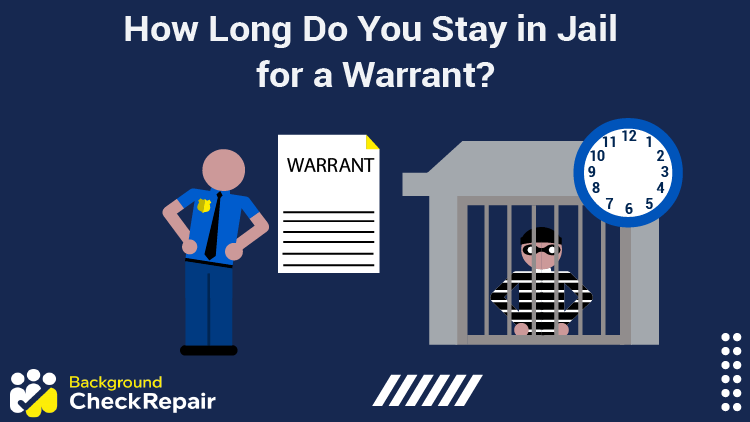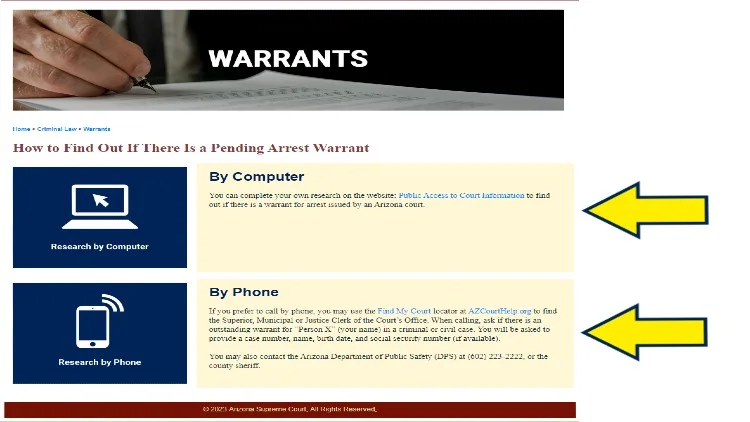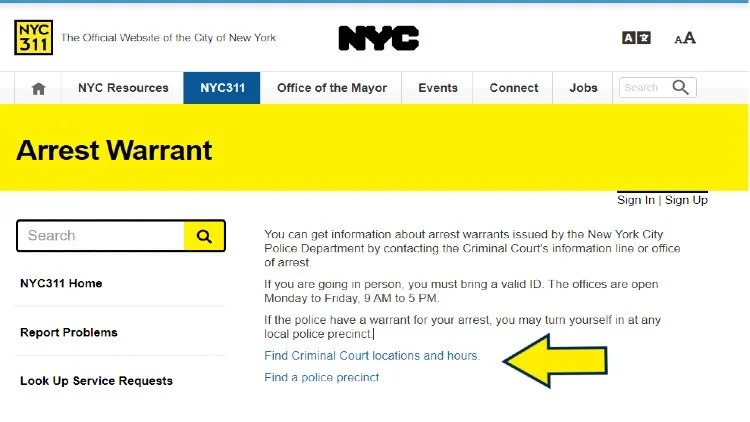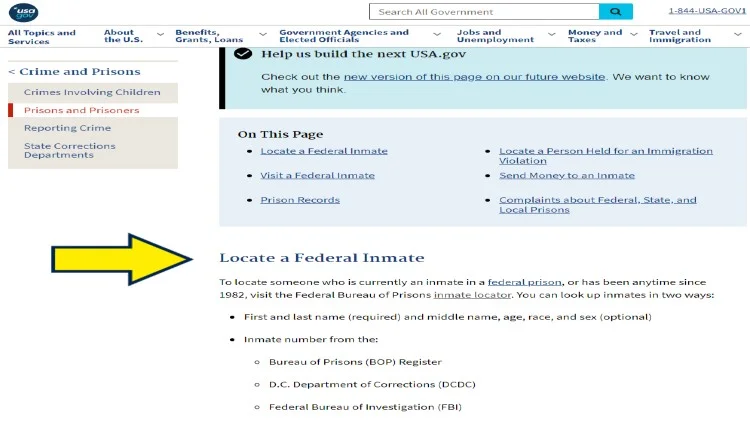How Long Do They Keep You in Jail for a Warrant?
Jail time as a result of a warrant can last anything from a few days to several months, depending on the charges against you.
 Written by Background Check Repair
Written by Background Check Repair
Criminal Records | April 29, 2024

Table of Contents
If a warrant has been issued for your arrest, you are probably wondering, how long do you stay in jail for a warrant?
Warrants do not expire, and when you are eventually arrested you will stay in jail until your bond is set and paid. After paying the bond, you will be released. If the charge against you is serious, you won’t be able to pay the bond and will stay in jail until your trial starts.
Many people also wonder about the duration that a trespassing record might appear on their file. It depends.
This guide explains how long you’ll have to remain in jail for a warrant, and what the time frame is based on the type of charge.
While the common perception is that police will release a suspect after 48 hours if they can’t charge them, it depends on when the arrest was made.

If you are arrested on a Friday,13 you will stay in jail until the following Monday. If the Friday precedes a long weekend, you will stay in jail until the following Tuesday.
When wondering how long do you stay in jail for a warrant, know that the answer will depend on a number of factors.
Depending on the crime you were arrested for, jail time for a warrant can last anything from a few days to several years.
So, how long do you stay in jail for a bench warrant?
If criminal charges are brought against you, a bench warrant will keep you in jail until your trial is done. A trial can last for several months, and if you are convicted you will spend even more time in prison.1
A bench warrant itself does not warrant any prison time, but once you are arrested you will remain in custody until your first court appearance.
This appearance usually takes place within two days, depending on when you were arrested.
Should you be unable to raise bail money, you will remain in jail until your trial starts.
The name ‘bench warrant’ literally comes from the process of a judge sitting on a bench when he issues a warrant.
Bench warrants are issued when a person refuses to appear in court after being summoned to do so.9 When the person is arrested, they usually stay in jail until they appear before a judge.
So, if you have a warrant can you just pay it?
Clearing a warrant typically requires a court appearance. In some cases, an attorney might appear in court on behalf of a defendant, but most of the time the defendant must appear in court themselves.
The answer to the question, how long do you stay in jail for a warrant, depends on the crime and the state where the warrant was issued.11 For example, if an arrest warrant is issued in Georgia for failure to appear in court, the jail time could amount to three days. If a misdemeanor warrant is issued in Texas, the jail time could be up to one year and include a fine of around $4,000.
If a bench warrant is issued in South Carolina, it could mean five years in prison providing the original offense was a felony. If the original offense was a misdemeanor, the jail time is reduced to one year.
A Class A warrant for a misdemeanor could carry a jail term of up to one year and can be expunged within one year as well.
Class B warrants for misdemeanors are not as serious as Class B warrants for felonies, and can carry a jail time of 180 days. However, a Class B felony warrant can carry jail time of life in prison.
A Class C warrant can carry jail time of up to 90 days.2
Prison sentences can be extended by the following aggravating factors:
So, how long does a warrant last? It also depends on the specific state.10
| State | Warrant Laws |
| Alabama | Warrants remain active until executed. Persons who are non-capital offenders must be given the option of bail. |
| Alaska | Warrants in Alaska must be executed within 30 days of being issued. The time frame can however be extended and the warrant itself does not have an expiry date. |
| Arizona | Warrants do not have an expiry date and will stay active until the person is arrested. The warrant can only be cleared by the court that issued it. |
| Arkansas | In Arkansas a search warrant may expire if not served within a certain time frame, but bench warrants are active until the person is arrested. |
| California | Neither bench warrants or arrest warrants expire in this state, but they must be executed within a stipulated time frame. Looking up criminal records within California may reveal active warrants. |
| Colorado | Bench warrants and arrest warrants stay active until an arrest is made or the person eventually dies. |
| Connecticut | There is no statute of limitations on bench or arrest warrants and they will stay active until an arrest is made. |
| Delaware | In general, a warrant will stay active until executed, but some warrants expire after the statute of limitations is passed. The civil SOL in Delaware is between 2-5 years, while the criminal statute of limitations is between 2-10 years. |
| Florida | Neither felony or misdemeanor warrants expire in Florida and will remain active until they are served. Rarely, a judge will recall a warrant. |
| Georgia | A misdemeanor warrant in Georgia usually reaches its time limit after 2 years. A low-level felony warrant will pass the statute of limitations after 7 years. Serious crimes including murder do not have a statute of limitations.3 |
| Hawaii | In Hawaii, a Class A felony warrant will expire after 6 years, while a misdemeanor warrant will expire after 2 years. It must be noted however, that a judge can reinstate a warrant at any time. Bench warrants and capital offense warrants never expire. |
| Idaho | Warrants issued in Idaho stay active until executed. Some warrants may be retracted by a judge, in particular if the person is found to be innocent. |
| Illinois | Felony warrants expire after three years. Misdemeanor warrants expire between six months and a year. |
| Indiana | Rearrest warrants and felony warrants do not expire in Indiana. Arrest warrants for misdemeanors expire after six months. |
| Iowa | Arrest warrants and bench warrants do not expire. Search warrants may expire after a stipulated time. |
| Kansas | Search warrants in Kansas are only valid for 96 hours after being issued. Arrest warrants and bench warrants have no expiry date. |
| Kentucky | Warrants issued in Kentucky do not have expiry dates, and remain active until an arrest is made. |
| Louisiana | A felony warrant expires after six years. Misdemeanor warrants expire after two years. Capital offenses warrants and bench warrants have no expiry date. |
| Maine | Some warrants issued in Maine have to be executed within a specified time frame, but bench warrants and arrest warrants have no expiry date. |
| Maryland | Search warrants have an expiry date which is set by the court. However, arrest warrants and bench warrants don’t expire until an arrest is made. |
| Massachusetts | Search warrants may be rendered invalid if they are not served within a set time frame. Bench warrants and arrest warrants do not have an expiry date. |
| Michigan | Arrest warrants and bench warrants do not have an expiry date.4 |
| Minnesota | Most warrants remain active until an arrest is made. These include bench warrants and arrest warrants. |
| Mississippi | A search warrant may expire after a stipulated time, but arrest warrants and bench warrants never expire. |
| Missouri | Misdemeanor warrants expire after one year, and felony warrants expire after three years. Most other warrants do not have an expiry date. |
| Montana | Search warrants have certain deadlines, and if a search is executed after the deadline it becomes illegal. Most other warrants do not have expiry dates.5 |
| Nebraska | Warrants remain active until the person is arrested or dies. Bench warrants issued in Nebraska can be executed in other states, and even other countries. |
| Nevada | Search warrants have an expiry date, but bench warrants and arrest warrants do not. |
| New Hampshire | Bench warrants only expire when an arrest is made or the person dies. Search warrants do have an expiry date, however. |
| New Jersey | Warrants do not have expiry dates, but suspects cannot be charged after five years. Warrants for serious offenses, including murder, do not have expiry dates. |
| New Mexico | Warrants do not have expiry dates, but if police do not apprehend suspects within a reasonable timeframe, the warrant may be dismissed. The time limit for felony warrants is up to six years and up to two years for misdemeanors. |
| New York | In New York, a bench warrant and an arrest warrant stays active until served. |
| North Carolina | Bench warrants and arrest warrants have no expiry date, but some warrants may be withdrawn by a court. |
| North Dakota | Search warrants and Ramey warrants have an expiry date that ranges between ten and ninety days. Other warrants, including bench warrants, do not have an expiry date. |
| Ohio | Bench warrants and arrest warrants do not expire until the person is arrested and appears in front of a judge. |
| Oklahoma | In general, warrants do not expire, but some warrants may be recalled by a judge. |
| Oregon | Warrants do not expire until police execute the warrant and make an arrest. However, sometimes a warrant is retracted by the court that issued it. |
| Pennsylvania | Most warrants do not expire, but will fall away once the subject hands himself over or is arrested by police. |
| Rhode Island | Search warrants are valid for fourteen days, but bench warrants and arrest warrants do not expire. |
| South Carolina | Arrest warrants and bench warrants do not expire. |
| South Dakota | Search warrants are valid for fourteen days, but bench warrants and arrest warrants do not expire. |
| Tennessee | Warrants in Tennessee typically have a five-year time limit. After an arrest warrant is issued, police officers only have ten days to serve the warrant. Bench warrants have no expiry date. |
| Texas | Arrest warrants and bench warrants do not expire after being issued and serious offenses have no time limitations. Misdemeanor warrants usually have a time limitation of two years. |
| Utah | In certain cases, arrest warrants may expire, but felony warrants do not expire. A statewide criminal records search in Utah may reveal active warrants. |
| Vermont | Search warrants issued in Vermont have an execution time limitation of ten days, and must be returned within ninety days. Bench warrants and arrest warrants do not expire. |
| Virginia | Inspection warrants can be used for a period of ten days, after which they become invalid if not renewed by a judge. Other types of warrants, including arrest and bench warrants do not have an expiry date. |
| Washington | Most warrants issued in Washington become invalid after seven years. However, an expired warrant can be reissued. |
| West Virginia | Felony warrants do not expire, but warrants issued for perjury offenses expire after three years. |
| Wisconsin | Warrants issued in Wisconsin do not expire, but in rare cases a warrant may be recalled by a judge. |
| Wyoming | Warrants issued in Wyoming do not have an expiry date, and they don’t become invalid when a suspect moves to another state. |
Also keep in mind that federal warrants have no expiry dates, and active warrants may be found during a criminal records search. An attorney is generally enlisted to perform a federal arrest warrant check.
At this point, you may be asking: how can I find out if I have a warrant?12
The best way to find out whether you have a warrant is to contact the local police department.

You need to keep in mind however, that if the police do a search and find that you have outstanding warrants, you may be arrested on the spot.
The best way to search for warrants by county is to conduct an online search using county websites.

If this doesn’t yield any results, you can ask a lawyer to do the search on your behalf, or you can approach the local police station.
Finding out whether someone is in jail, follows much the same process as searching for active warrants.
You can check the local county website for information, or even the local court and police department’s website.

If there is no information on any of these websites, it may be a good idea to check the official websites of other counties or search the Federal Bureau of Prisons website.6
The best thing to do after finding out that you have an outstanding warrant is to contact a criminal defense lawyer.

Then you should get in touch with a bail bondsperson in the event that you have to pay a bond amount. After speaking to the bondsperson you and your lawyer should arrange a time for you to turn yourself in.7
Other than being arrested for an outstanding warrant,14 there are additional consequences as well. You could end up in prison, pay exorbitant amounts in fees and costs or have your driver’s license suspended. In addition to this, you may experience difficulty in securing employment, because many employers are not willing to employ people with outstanding warrants.8
The answer to the question, how long do you stay in jail for a warrant, must include all aspects of a warrant including the consequences such as jail time.
Jail time as a result of a warrant can last anything from a few days to several months, depending on the charges against you.
If you committed a crime, or failed to appear in court after being summoned, you will most likely have an outstanding arrest warrant.
It usually takes a few hours to get a search warrant depending on the availability of the judge. Arrest warrants can take anything from days to months to obtain.
Contacting the local police station or court is the best way to find out whether you have an outstanding warrant.
The best way to deal with a fugitive warrant is to get a criminal defense lawyer and have them guide you through the process of turning yourself in and appearing in court.
After you turn yourself in for a bench warrant, you will be required to appear in court. Depending on the charges against you, you will either pay a fine, a bond amount or have to serve jail time.
1Shouse Law Group. (2021, September 22). How long do you stay in jail for a bench warrant? Shouse Law Group <https://www.shouselaw.com/ca/blog/how-long-do-you-stay-in-jail-for-a-bench-warrant/>
2Utah Courts. (n.d.). Criminal Penalties. Utah Courts. <https://www.utcourts.gov/en/self-help/case-categories/criminal-justice/penalties.html>
3Claiborne Firm. (n.d.). Arrest Warrants and Bench Warrants In Georgia Explained. Claiborne Firm. <https://www.claibornefirm.com/arrest-warrants-vs-bench-warrants-in-georgia/>
4Dallo Law. (n.d.). How to Clear Your Arrest Warrant in Michigan | Oakland County Attorneys. Dallo Law. <https://dallolaw.com/criminal-defense/criminal-process/arrest-warrant/>
5Montana State Records. (n.d.). Montana Warrant Search | StateRecords.org. Montana State Records. <https://montana.staterecords.org/warrant>
6Sandvick, C. M., Kalima, C., & Knutson, K. (n.d.). 3 Ways to Find out if Someone Is in Jail. wikiHow. <https://www.wikihow.com/Find-out-if-Someone-Is-in-Jail>
7Long, H. W. (n.d.). What to Do If There Is a Warrant Out for Your Arrest. Browning and Long. <https://www.browninglonglaw.com/faqs/what-to-do-if-there-is-a-warrant-out-for-your-arrest.cfm>
8K. D. (n.d.). Understanding the Potential Consequences of Outstanding Warrants. Lera Blog. Retrieved from <https://lerablog.org/business/law/understanding-the-potential-consequences-of-outstanding-warrants/>
9Child Support Services Division. (2023). Bench Warrants. Child Support Services Division. Retrieved January 19, 2023 <https://cssd.dc.gov/page/bench-warrants>
10The General Court of the Commonwealth of Massachusetts. (2023). Section 29. The 193rd General Court of the Commonwealth of Massachusetts. Retrieved January 19, 2023 <https://malegislature.gov/Laws/GeneralLaws/PartIV/TitleII/Chapter276/Section29>
11North Carolina General Assembly. (2023). Warrant for Arrest. In Enacted Legislation (p. 2). <https://www.ncleg.gov/EnactedLegislation/Statutes/PDF/BySection/Chapter_15A/GS_15A-304.pdf>
12Roanoke County, Virginia. (2023). Outstanding Warrants. Roanoke County, Virginia. Retrieved January 19, 2023 <https://www.roanokecountyva.gov/563/Outstanding-Warrants>
13Scott County Law Enforcement Center. (2023). Jail / Warrants. Scott County Law Enforcement Center. Retrieved January 19, 2023 <https://www.scottcountymn.gov/1512/Jail-Warrants>
14United States District Courts. (2023). United States District. Arrest Warrant. Retrieved January 19, 2023 <https://www.uscourts.gov/forms/law-enforcement-grand-jury-and-prosecution-forms/arrest-warrant>
We use cookies to ensure that we give you the best experience on our website. If you continue to use this site we will assume that you are happy with it